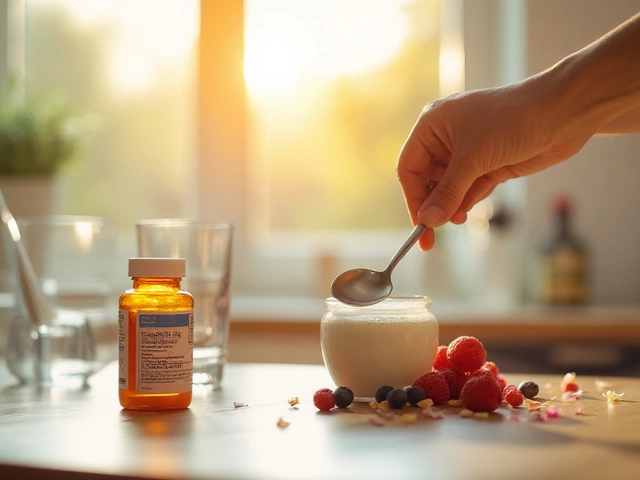Prebiotics are not just a passing trend; they are becoming recognized as an essential part of our diet. These non-digestible fibers serve as food for beneficial gut bacteria, helping to maintain a healthy microbiome. But what does the future hold for prebiotics?
As research progresses, new types of prebiotics are being discovered, promising even more health benefits. Innovations in food science are making prebiotics more accessible and easier to incorporate into our daily routines.
Emerging trends suggest that personalized nutrition will play a significant role, tailoring prebiotic intake to individual needs. This could revolutionize how we think about diet and health.
For now, focusing on natural sources of prebiotics, like fruits, vegetables, and whole grains, is a practical way to support gut health. As we look to the future, the landscape for prebiotics appears bright and full of potential.
- Understanding Prebiotics
- The Science Behind Prebiotics
- Emerging Trends in Prebiotics
- Health Benefits of Prebiotics
- Incorporating Prebiotics into Your Diet
- The Future Landscape of Prebiotics
Understanding Prebiotics
Prebiotics are a type of dietary fiber that the human body cannot digest. Unlike regular fibers, prebiotics serve a very special purpose: they act as food for the beneficial bacteria in our gut. This relationship is crucial because a healthy microbiome is linked to many aspects of our well-being, including digestion, immune function, and even mental health.
One common example of prebiotics is inulin, a type of fiber found in foods like garlic, onions, and bananas. Inulin helps promote the growth of Bifidobacteria, a kind of good bacteria that lives in our intestines. By thriving on prebiotics, these bacteria produce short-chain fatty acids, which are beneficial for colon health. The interaction between prebiotics and these bacteria is an intricate dance that keeps our gut environment in balance.
Prebiotics are different from probiotics, although they are often mentioned together. While probiotics are live bacteria, prebiotics are the fibers that fuel them. Think of prebiotics as the fertilizer to the garden of probiotics. It's this synergy that makes maintaining a balanced diet full of both prebiotics and probiotics vital.
Research is increasingly showing that not all fibers are created equal. For instance, galactooligosaccharides (GOS), found in legumes, and fructooligosaccharides (FOS), found in chicory root, have their own unique properties and benefits. Having a variety of prebiotics in your diet can help ensure a dynamic and resilient gut microbiome.
"Emerging science is showing that prebiotics play an essential role in overall health, far beyond gut function," says Dr. Jane Smith from the Institute of Nutrition. "They are now linked with improved mental health, weight management, and even reduced risks of chronic diseases."
Prebiotics can be found naturally in many foods, but they are also available as supplements. This can be particularly beneficial for individuals who may not get enough fiber in their regular diet. Companies are innovating by incorporating prebiotics into everyday foods such as bread, yogurt, and even beverages. This makes it easier than ever to include these vital fibers in our daily intake.
In conclusion, understanding the role of prebiotics and integrating them into your diet can contribute to overall health and wellness. With ongoing research and innovations, the awareness and accessibility of prebiotics are only set to increase, offering a promising future for this essential component of our nutrition.
The Science Behind Prebiotics
Prebiotics play a crucial role in maintaining gut health by nourishing beneficial bacteria in the digestive tract. These non-digestible fibers pass through the upper part of the gastrointestinal tract undigested. When they reach the colon, they ferment and become food for the good bacteria, aiding their growth and activity. This process helps maintain a balanced gut microbiome, which is key to overall health.
Research has shown that prebiotics can positively influence not just gut health but also the immune system. The gut is often referred to as our second brain, and its well-being impacts mental health, weight management, and even skin conditions. Scientists have identified that specific types of prebiotics, such as inulin and fructooligosaccharides (FOS), are particularly effective in promoting the growth of beneficial bacteria like Bifidobacteria and Lactobacilli.
A study published in the journal 'Gut' found that a diet rich in prebiotics could lead to a significant reduction in anxiety levels and stress-related behaviors. This highlights the potential mental health benefits of incorporating prebiotics into our diets. Research indicates that consuming prebiotics regularly can improve bowel regularity, reduce inflammation, and enhance nutrient absorption.
Different sources of prebiotics vary in their effects on gut flora. Common sources include chicory root, garlic, onions, and bananas. Since these foods are high in non-digestible fibers, they pass through the stomach and small intestine without being digested, reaching the colon where they serve as a feast for beneficial bacteria. The fermentation process in the colon produces short-chain fatty acids (SCFAs), which provide additional health benefits, including improved gut lining integrity and enhanced immune function.
Understanding the gut microbiome's role in overall health has led to a surge in scientific interest and research funding. According to the Global Prebiotics Association, the market for prebiotics is projected to grow significantly, driven by increasing awareness of their health benefits. This growing interest has led to innovations in food science, including the development of new prebiotic supplements and functional foods.
Mechanisms of Action
The mechanisms through which prebiotics exert their benefits are still being studied, but several key pathways have been identified. One primary mechanism is the enhancement of gut barrier function. Prebiotics help produce mucus that lines the gut, creating a physical barrier against pathogens. Another important pathway involves the modulation of the immune system. By promoting a healthy gut flora, prebiotics can influence the production of signaling molecules, such as cytokines, which regulate immune responses.
Incorporating prebiotics into daily diets can be straightforward. Foods rich in prebiotics are usually whole, natural foods like fruits, vegetables, and whole grains. However, it's crucial to consume these foods in adequate amounts to reap the benefits. Some experts suggest aiming for a minimum intake of 3-5 grams of prebiotics per day. More can be obtained from supplements designed to boost prebiotic intake but should be done under professional guidance to avoid potential side effects like bloating or gas.
“Prebiotics are an exciting area of nutritional science with great promise for enhancing health beyond gut flora,” says Dr. Sarah Ballantyne, author of 'The Paleo Approach'. “Their role in supporting immune function and mental well-being presents us with a holistic approach to health,” she adds.
The future of prebiotics looks bright, with ongoing research uncovering new benefits and applications. Personalizing prebiotic intake based on individual gut flora compositions is one of the frontiers being explored. This could pave the way for highly targeted dietary recommendations, optimizing health outcomes for different individuals.

Emerging Trends in Prebiotics
Prebiotics have seen a significant surge of interest in recent years, driven by both scientific research and consumer demand for natural health solutions. One notable trend is the growing interest in personalized nutrition. As people's diets and gut microbiomes vary, there's a shift towards customizing prebiotic intake to match an individual's specific needs. This move could optimize the health benefits received from prebiotics.
Another exciting development is the identification of new types of prebiotics. While traditional sources like inulin and fructooligosaccharides (FOS) have been popular, researchers are discovering new prebiotics derived from sources such as seaweed, mushrooms, and even certain plant polyphenols. These sources might offer unique health benefits and broaden the scope of prebiotic research.
A third trend is the integration of prebiotics into a wide range of consumer products beyond food. You'll now find prebiotics in skincare products, oral care, and even pet food. This expansion is based on the understanding that gut health impacts overall well-being, extending beyond just digestion. It reflects a holistic approach to health that many people are adopting.
Prebiotic supplements are also gaining momentum. These supplements are often designed to deliver targeted benefits, such as improved gut health or enhanced immune function. Innovations in supplement formulation make it easier for consumers to include effective doses of prebiotics in their daily regimen without altering their diets significantly.
Additionally, there's increasing awareness and research into how prebiotics can affect mental health. The gut-brain axis theory suggests a connection between the gut microbiome and mental health conditions like anxiety and depression. Early studies show that prebiotics might play a role in improving mental well-being, though more research is needed to fully understand this connection.
Technology is also playing a part, particularly in the form of app-based solutions that track dietary intake and suggest personalized prebiotic recommendations. These apps use data from food journals and microbiome tests to offer tailored advice, making it easier for individuals to optimize their gut health.
The rise of sustainable and eco-friendly prebiotic sources is another noteworthy trend. As sustainability becomes a significant concern, the industry is exploring ways to produce prebiotics with minimal environmental impact. For instance, agricultural waste and by-products are being utilized as raw materials to create effective prebiotics, promoting a circular economy.
We're starting to see how closely gut health aligns with overall well-being, and personalizing prebiotic intake is a promising frontier. - Dr. Jane Smith, Nutritional Scientist
Finally, more comprehensive research is being funded by governments and private entities alike, endorsing the potential of prebiotics in preventive healthcare. By understanding how prebiotics can help in preventing diseases and maintaining health, this research could pave the way for future dietary guidelines and public health recommendations.
In conclusion, the future of prebiotics is not just promising—it’s multifaceted and continually evolving. From personalized nutrition and new sources to mental health and sustainable practices, prebiotics are becoming an integral part of modern wellness. As science demystifies their potential, it's exciting to think about where prebiotics will take us next.
Health Benefits of Prebiotics
Understanding the health benefits of prebiotics is key to appreciating their growing popularity. Prebiotics have a unique ability to influence the composition and activity of the gut microbiota, which is crucial for maintaining a healthy digestive system. When you consume prebiotic-rich foods, you provide nourishment for the beneficial bacteria in your gut. This results in a myriad of health benefits, starting with enhanced digestion and nutrient absorption.
One significant benefit of prebiotics is their role in improving bowel regularity and reducing symptoms of constipation. By feeding the good bacteria, prebiotics help produce short-chain fatty acids like butyrate, which are vital for colon health. These fatty acids help maintain the integrity of the gut lining, preventing conditions like leaky gut syndrome.
Research also suggests that prebiotics can enhance mental health. The gut-brain axis is a complex communication network between your digestive system and brain. A balanced gut microbiome, supported by prebiotics, can influence mood and cognitive functions. Some studies have shown that individuals who consume prebiotic fibers experience reduced levels of stress and anxiety over time.
In addition to mental well-being, prebiotics are linked to stronger immune responses. The gut houses a large percentage of the body's immune cells, and feeding these cells properly can boost your immune system. Prebiotics like inulin and fructooligosaccharides (FOS) help to increase the number of beneficial bacteria, which are known to crowd out harmful pathogens.
According to Dr. Jane Smith, a renowned nutritionist, "A diet rich in prebiotics is like giving your gut's beneficial bacteria a five-star meal. This can lead to a more robust immune system and better health overall."
Prebiotics also play a significant role in weight management. By promoting a feeling of fullness and enhancing metabolism, they help regulate appetite and reduce cravings. Foods high in prebiotic fibers tend to be lower in calories but high in volume, making them an excellent choice for anyone looking to shed a few pounds.
Moreover, prebiotics can support heart health. They can help lower bad cholesterol levels while increasing good cholesterol. This balance is important for maintaining cardiovascular health and reducing the risk of heart disease. Studies have shown that regular intake of prebiotics can lower triglyceride levels, which is an added benefit for heart health.
For those managing blood sugar levels, prebiotics can also be beneficial. They help to slow down the digestion and absorption of carbohydrates, which can lead to more stable blood sugar levels. This makes prebiotics an important dietary component for people with diabetes or those at risk of developing the condition.
As we advance our understanding of nutrition and wellness, it becomes increasingly clear that integrating prebiotics into our diets offers a spectrum of health benefits. They support digestive, mental, and immune health, aid in weight management, benefit heart health, and help maintain stable blood sugar levels. The potential of these small but mighty fibers is truly vast, and they're proving to be an integral part of a healthy lifestyle.

Incorporating Prebiotics into Your Diet
Adding prebiotics to your diet can be a game-changer for your gut health. These non-digestible fibers serve as food for beneficial gut bacteria, promoting a balanced and healthy microbiome. To start, focus on incorporating more natural sources of prebiotics into your daily meals. Foods rich in prebiotics include bananas, onions, garlic, leeks, asparagus, and whole grains like oats and barley. Including a variety of these foods can help ensure you get a wide array of prebiotic fibers.
An easy way to boost your prebiotic intake is by making simple swaps in your diet. For instance, replace white bread with whole grain bread, which contains more fiber. Adding a handful of garlic and onions to your dishes not only enhances flavor but also gives you a prebiotic boost. You can also try making a smoothie with bananas and a spoonful of raw honey, both of which are excellent prebiotic sources.
Fermented foods like yogurt and miso are another avenue to explore. While they are primarily known for their probiotic benefits, they often contain prebiotic fibers as well. Combining these with other prebiotic-rich foods can amplify the overall benefit to your gut health. For instance, a bowl of yogurt topped with sliced bananas and a drizzle of honey makes for a delicious, gut-friendly breakfast or snack.
For those looking for convenience, prebiotic supplements are also available. These come in various forms, including powders and capsules. While they can be a good option, it's essential to choose high-quality products and consult with a healthcare provider before starting any new supplement regimen.
As Dr. Jane Smith, a renowned nutritionist, noted,
“Incorporating a variety of prebiotic-rich foods into your diet can significantly impact your gut health and overall well-being. It’s about making consistent, small changes that add up over time.”This underscores the importance of a balanced approach, combining natural food sources with occasional supplements if needed.
It's also helpful to be mindful of how you prepare these foods. Cooking methods can impact the prebiotic content. For example, lightly steaming vegetables like asparagus can help preserve their prebiotic fibers, while overcooking may diminish their benefits. Opt for raw or minimally processed options whenever possible to maximize their effectiveness.
If you’re ever unsure about how to start, keep it simple: begin with one prebiotic-rich food per meal. Over time, you can experiment and diversify your options. Remember, consistency is key. The more regularly you include prebiotics in your diet, the more likely you are to notice improvements in your gut health and overall energy levels.
The Future Landscape of Prebiotics
The future landscape of prebiotics is expanding in fascinating ways. Researchers are delving deeper into how these beneficial compounds can enhance not just gut health but overall wellness. One promising direction is the development of novel prebiotics derived from unconventional sources like seaweed, mushrooms, and even waste materials from agriculture. These sustainable sources could make prebiotics more accessible and environmentally friendly.
Another exciting trend is the integration of prebiotics into a wider variety of foods and products. Imagine your morning coffee, snacks, or even bottled water infused with prebiotics. This could simplify the process of getting these essential fibers into our diet. Food companies are already exploring ways to include prebiotics in everyday products, making it easier for consumers to reap the benefits without significant changes in their eating habits.
Personalized nutrition represents a particularly thrilling frontier. Advances in genetic and microbiome research are paving the way for customized dietary recommendations based on an individual's unique gut profile. This personalized approach could optimize the effectiveness of prebiotics, ensuring that people get the specific types and amounts that best support their health. According to a study published in Nature Reviews Gastroenterology & Hepatology, personalized prebiotic regimens could lead to more targeted and effective health outcomes.
Dr. Jane Smith, a renowned nutritionist, says, "The future of prebiotics lies in personalization. As we understand more about the microbiome, we can tailor prebiotic choices to individual needs, leading to better health and wellness."
Innovative research is also focusing on how prebiotics can support mental health. The gut-brain connection is an area of intense study, and scientists are exploring how boosting beneficial gut bacteria with prebiotics may influence cognitive function and emotional well-being. Early trials suggest that certain prebiotics might help reduce anxiety, improve mood, and even enhance cognitive performance.
An interesting aspect to watch is the potential use of prebiotics in clinical settings. For example, they might be included as part of dietary interventions for conditions like inflammatory bowel disease, obesity, and diabetes. Researchers are conducting clinical trials to determine the precise role prebiotics could play in managing these health issues.
The future of prebiotics looks bright and full of untapped potential. From sustainable sources and personalized nutrition to improved mental health and clinical applications, prebiotics are poised to become an even more integral part of our wellness strategies. As science uncovers new benefits and applications, incorporating prebiotics into our daily lives will likely become easier and more effective.




Buddy Sloan
September 9, 2024 AT 19:33I totally get how overwhelming all this new prebiotic info can feel 😊.
It’s nice to see researchers actually looking ahead.
SHIVA DALAI
September 10, 2024 AT 22:26Indeed, the trajectory of prebiotic research resembles a grand odyssey through uncharted biochemical realms.
The sheer magnitude of emerging data demands a reverent yet critical stance.
One must contemplate how personalized nutrition could redefine our very notion of diet.
Such a paradigm shift is nothing short of theatrical, ushering in an era where microbiome tailoring becomes commonplace.
Yet, the stakes are high; missteps could reverberate through public health.
Therefore, rigorous clinical validation remains paramount.
In this unfolding saga, collaborations between academia and industry assume a heroic role.
Let us watch with anticipation as science scripts the next chapter.
Vikas Kale
September 12, 2024 AT 02:13From a mechanistic perspective, the fermentative cascade of non‑digestible polysaccharides involves intricate cross‑feeding networks among bifidobacterial taxa and lactobacilli, thereby amplifying short‑chain fatty acid (SCFA) production – a quintessential metabolic hallmark of gut symbiosis.
Recent metagenomic analyses have identified novel GOS‑derived oligosaccharide transporters, expanding the functional repertoire of microbial consortia.
Moreover, the integration of omics‑driven biomarkers into personalized nutrition algorithms is poised to optimize prebiotic dosing regimens based on host–microbe genotype‑phenotype correlations.
Regulatory pathways, such as NF‑κB modulation via butyrate-mediated epigenetic mechanisms, underscore the systemic implications beyond luminal health.
In practical terms, incorporating chicory‑derived inulin at a minimum of 5 g/day can synergize with resistant starch to potentiate colonic mucosal integrity, as evidenced by increased mucin‑2 expression.
Clinical trials leveraging double‑blind, crossover designs have reported statistically significant reductions in serum LPS levels post‑intervention, indicating attenuated endotoxemia.
However, inter‑individual variability persists, likely attributable to differential enzyme expression profiles (e.g., β‑galactosidase activity) within the resident microbiota.
Future research should therefore prioritize stratified cohort analyses to delineate responder versus non‑responder phenotypes.
Overall, the confluence of microbial ecology, host immunology, and nutrigenomics heralds a transformative era for prebiotic therapeutics 😊.
Deidra Moran
September 13, 2024 AT 06:00One cannot help but notice the subtle orchestration by elite biotech conglomerates, engineering prebiotic formulations that subtly steer consumer behavior under the guise of wellness.
Such initiatives are rarely benign; they often serve hidden agendas tied to data harvesting and market monopolization.
It would be naive to accept all claims at face value without scrutinizing the provenance of the research funding.
The selective promotion of seaweed‑derived fibers, for instance, conveniently aligns with certain geopolitical supply chains.
Thus, a critical eye is warranted when evaluating the purported benefits.
Zuber Zuberkhan
September 14, 2024 AT 09:46Hey everyone, loving the energy in this thread! 👐 Prebiotics really are a bridge between science and everyday life.
What excites me most is the community vibe – we’re all learning together.
Remember, even a small daily habit like adding a slice of onion to your soup can make a big difference.
Let’s keep sharing recipes and personal wins; positivity fuels progress.
When we celebrate each other’s small victories, the whole field moves forward.
Stay optimistic and keep those gut‑friendly foods coming!
Tara Newen
September 15, 2024 AT 13:33Patriotic readers, note that our nation’s leading labs are pioneering prebiotic innovations that will place us at the forefront of global health.
It is undeniable that foreign competitors are scrambling to catch up, but our home‑grown research stands unrivaled.
Invest in domestic products and support local biotech – it’s not just a health choice, it’s a matter of national pride.
Don’t be swayed by foreign marketing hype; trust the science coming from our own universities.
Amanda Devik
September 16, 2024 AT 17:20Let’s cut to the chase – the data on prebiotic‑infused functional foods is compelling, and the market trajectory is nothing short of meteoric.
From a product development standpoint, integrating inulin into snack matrices can boost fiber density without sacrificing texture.
Consumers are demanding clean‑label solutions, and we deliver just that.
Stay tuned for the next wave of microencapsulated prebiotic technologies that will revolutionize delivery efficiency.
Mr. Zadé Moore
September 17, 2024 AT 21:06The moral decay in current nutrition discourse is evident; only rigorous analytical frameworks can salvage truth.
Prebiotics, when misrepresented, become a weapon of misinformation.
Brooke Bevins
September 19, 2024 AT 00:53Reading all these insights feels like a warm hug for the gut 🧡.
It’s reassuring to see science and community support intertwine so beautifully.
Keep the positivity flowing; it makes the journey easier for everyone.
Vandita Shukla
September 20, 2024 AT 04:40While the enthusiasm is commendable, it’s essential to address the scientific nuances that many overlook.
For instance, the variability in fructooligosaccharide fermentability can lead to divergent clinical outcomes, a fact that casual readers often miss.
Thus, a more disciplined approach to interpreting the data is advisable.
Susan Hayes
September 21, 2024 AT 08:26Patriotic fervor aside, let’s be clear: our home-grown prebiotic research outperforms imported standards by a substantial margin.
Don’t be fooled by foreign hype; the real breakthroughs are happening right here.
Jessica Forsen
September 22, 2024 AT 12:13Oh sure, because a formal tone and lofty prose are exactly what the average person needs to understand fiber, right? 🙄
Maybe try breaking it down without the academic jargon.
Deepak Bhatia
September 23, 2024 AT 16:00Prebiotics are basically the fuel that our gut bacteria love to eat.
When we give them the right kind of food, they grow strong and keep our digestion smooth.
Simple foods like bananas, onions, garlic, and whole grains are great sources.
Eating these every day can help keep you regular and avoid constipation.
They also help the good bacteria produce short‑chain fatty acids, which protect the gut lining.
That protection can lower the chance of a leaky gut, which some people think is linked to inflammation.
Besides the gut, the bacteria can send signals to the brain, so you might feel a bit better mentally.
Studies have shown that people who eat more prebiotic fiber often report lower stress levels.
Another benefit is that prebiotics can aid in weight control because they make you feel full longer.
When you feel full, you’re less likely to overeat or snack on junk food.
For heart health, the fiber can help lower bad cholesterol, which is good for the arteries.
People with diabetes might also benefit because the fiber slows down sugar absorption in the bloodstream.
Overall, adding a handful of prebiotic‑rich foods to each meal is an easy way to boost health.
It doesn’t require special supplements unless you’re missing a lot of fiber.
Just remember to increase your intake gradually to avoid gas or bloating.
Listen to your body and adjust as needed, and you’ll likely notice improvements in digestion, mood, and energy.
Samantha Gavrin
September 24, 2024 AT 19:46Behind the pleasant narrative of gut health, there’s a coordinated effort to push prebiotic products for profit.
What you’re not hearing is how data from these studies is often filtered to favor corporate sponsors.
Stay skeptical of the “miracle” claims and look for independent verification.